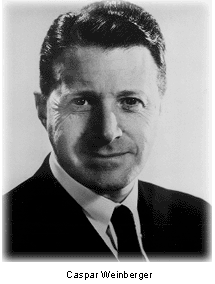Caspar Weinberger rose to the position of the Secretary of Defense where he participated in the transfer of TOW missiles to Iran, during the Iran-Contra Affair. That action led to his resignation on November 23, 1987, after he was indicted on several felony charges of lying to the Iran-Contra independent counsel during its investigation. Born in San Francisco, California, Weinberger graduated in 1938 from Harvard College with a bachelor’s degree. He later received his law degree from Harvard Law School in 1941.
 After his time at school, he served in World War II in the Forty-First Infantry Division. Upon his return in 1945, Weinberger became the law clerk to United States Court of Appeals Judge William E. Orr. In 1947, he left Judge Orr to begin his own private law practice. With his experience, he was elected to the Assembly of the California State Legislature in 1952 with a unanimous re-election in 1954 and 1956.
In 1958, he went back to practicing law for almost 10 years when, in 1969, he was nominated by President Richard Nixon for the Chairman of the Federal Trade Commission. He held the position until 1972 when he was promoted to the Director of the Office of Management and Budget. In 1973, he was appointed the Secretary of Health, Education, and Welfare until 1975 when his reputation in Washington as an able administrator earned him the position of Secretary of State from President ^Ronald Reagan in 1981 until his resignation.
During that time, he pushed for an increase nuclear weapons, which helped to escalate the Cold War. For the next ten years, Weinberger was publisher and chairman of Forbes Magazine and later wrote a book on his years in the Pentagon and one he co-authored on the adequacy of U.S. military capabilities after the Cold War.
After his time at school, he served in World War II in the Forty-First Infantry Division. Upon his return in 1945, Weinberger became the law clerk to United States Court of Appeals Judge William E. Orr. In 1947, he left Judge Orr to begin his own private law practice. With his experience, he was elected to the Assembly of the California State Legislature in 1952 with a unanimous re-election in 1954 and 1956.
In 1958, he went back to practicing law for almost 10 years when, in 1969, he was nominated by President Richard Nixon for the Chairman of the Federal Trade Commission. He held the position until 1972 when he was promoted to the Director of the Office of Management and Budget. In 1973, he was appointed the Secretary of Health, Education, and Welfare until 1975 when his reputation in Washington as an able administrator earned him the position of Secretary of State from President ^Ronald Reagan in 1981 until his resignation.
During that time, he pushed for an increase nuclear weapons, which helped to escalate the Cold War. For the next ten years, Weinberger was publisher and chairman of Forbes Magazine and later wrote a book on his years in the Pentagon and one he co-authored on the adequacy of U.S. military capabilities after the Cold War.